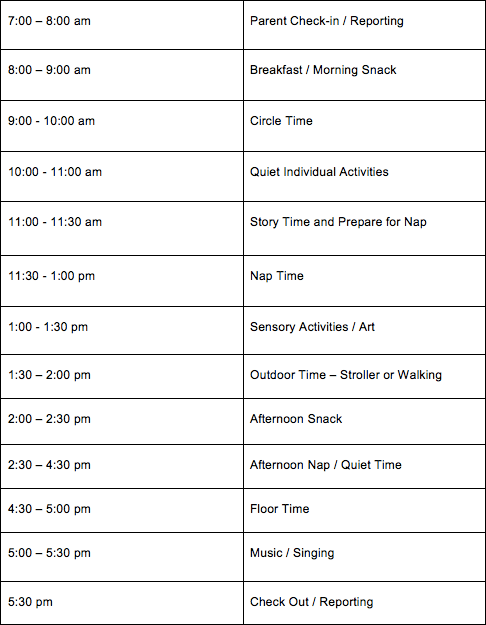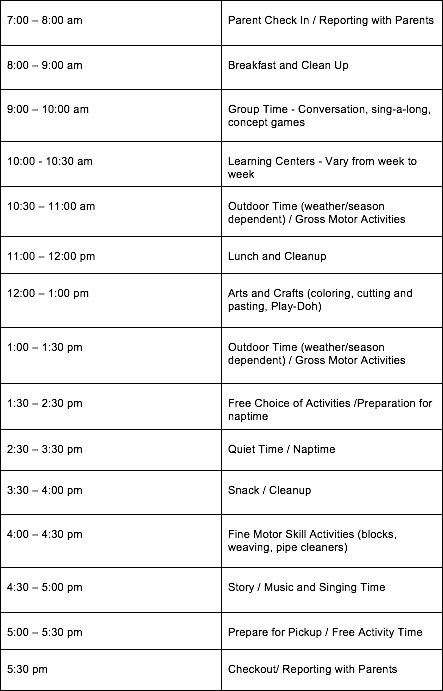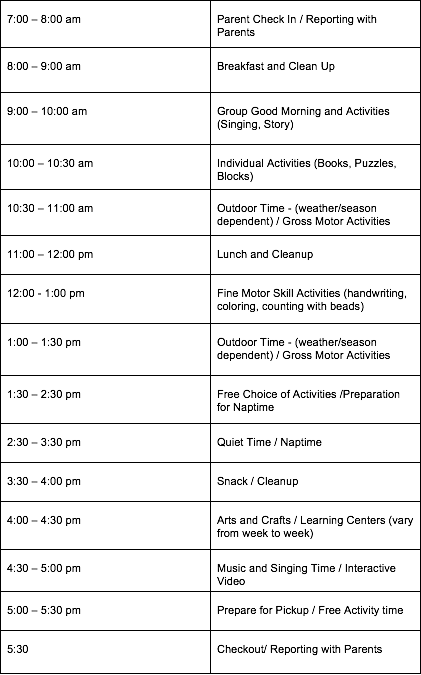The Importance of a Consistent Daycare Schedule for Infants and Toddlers
From a staffing perspective, having a consistent daycare schedule in place ensures that each team member understands what resources will be required for the day. It’s essential to know which activities are planned for each age group, how much supervision is required, and if any children require individualized care. This will ensure there are enough staff members to meet required child-to-staff ratios, and provide quality care.
Aside from simplifying operations from an administrative perspective, following a daycare schedule is necessary to establish order in children’s lives. Parents and caregivers should establish this regularity as early on as possible. These routines remove unknowns from children’s daily lives that cause undue stress. A reliable daycare schedule helps to regulate behavior, as children know what to expect at each part of the day. This understanding and consistency makes kids more confident and bold in pursuing their interests. Schedules also help children build an understanding of patterns.
Furthermore, being provided for regularly will build an essential trust between the child and their caregiver. Following routines ensures that children know their caregiver will be there to address any needs that arise. This knowledge fosters stability and builds the comfort level the child feels toward their environment.
Finally, a regular daycare schedule makes it easier to encourage and monitor each child’s development in critical areas, namely: emotional, social, language, cognitive, physical, and motor skill development. A defined schedule helps instructors incorporate activities and exercises to foster this early development. Instructors can then coordinate with student’s parents for the best course of action based upon their developmental progress.
With these benefits in mind, we’ve built out some examples of daily daycare schedules for infants, toddlers, and preschoolers, to help daycare owners build quality programs.
Infant Daycare Schedule
Infants are typically categorized as newborns to one year old. A little more flexibility is needed within infant daycare scheduling, as it will largely be based around their biological schedule of when they need to eat and sleep.
Example Infant Daycare Schedule
Toddler Daycare Schedule
Toddlers typically range from ages one to three years old. As toddlers may be new to daycare environments, it is a good idea to encourage parents to incorporate some of this routine into their kid’s daily lives at home as well. This will establish normalcy and make sure their kids do not feel overwhelmed by the change in routine.
Example Toddler Daycare Schedule
Preschooler Daily Schedule
Preschool aged children typically range from three to five years old. As you get to know your preschoolers’ interests and personalities better, it is a good idea to plan some activities or projects that encourage and stimulate kid’s individual interests.
Example Preschool Daily Schedule
Simplifying Daycare Schedules for Infants and Toddlers
When it comes to running a daycare center, consistency is key. Having an established schedule that addresses major developmental goals, even if the specific activities vary day-to-day, allows for the highest quality care. Also, having a consistent routine allows instructors to monitor each child’s progress, and coordinate with parents on daily care plans.
Procare’s Family Data solution assists daycare providers on a daily basis, acting as a central hub for important student information, and student and teacher scheduling. Within Family Data, instructors can monitor each students schedule, ensure proper student-to teacher ratios, and account for any individualized attention a student requires within their day.
Additionally, by incorporating classroom management and family engagement, parents and caregivers can communicate with each other directly every day to give daily reports on daycare activities and schedules, as well as to share pictures, and more.
Final Thoughts
Having a daily routine can foster comfort, trust, and confidence in infants, toddlers and preschoolers. By building out daily, age appropriate schedules, daycare providers not only simplify their administrative and staffing tasks, they also ensure happy, healthy children, and engaged parents.
Looking for more information on how to simplify your daily daycare schedules? See how Procare can help.










